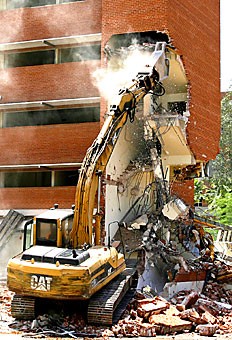Former occupants associate the Franklin building with memories of physical illness, noise pollution, backed up sewers and other horrific experiences.
But those times have come to an end as demolition of the building began Monday to make way for the McClelland Park building, the future home of the Norton School of Family and Consumer Sciences.
“”That building is sick,”” said Beth Marlatt, business manager for the Near Eastern studies department that used to be located in the Franklin building. “”(Franklin) made people sick, especially on 5th floor and in the basement – people would get physically ill with respiratory problems, allergic reactions, headaches and other problems.””
Risk management conducted numerous air quality tests because people would get sick and have to go home, but they never found anything conclusive, Marlatt said.
The sewers would back up and there were bacteria and water problems in the basement, she said.
“”I think really that there was nothing that could be done apart from demolishing it,”” Marlatt said. “”Franklin did serve a purpose, but it won’t be missed.””
The Franklin building was built in 1960 as the home of the James E. Rogers College of Law. The law school moved in 1979 and the building then became home to the journalism, Near Eastern studies and East Asian studies departments as well as the center for Middle Eastern studies.
In 2004 the journalism department, Near Eastern studies department and the center for Middle Eastern studies moved to the Louise F. Marshall Building, leaving Franklin vacant during the past two years.
“”God, what a nightmare,”” said Paul Johnson, academic advisor for the journalism department of the time spent in Franklin. “”All of us that worked there, we want to forget that chapter in our lives.””
The journalism department was located in the basement of Franklin, which had originally been the library for the law school.
The space proved to be too noisy for classes and the nearest bathroom and drinking fountain were two floors away, Johnson said.
“”The really bad part was the mold and bacteria that infested the place,”” Johnson said. “”It was so bad that the university had to come in one year and close off all the faculty offices. Men in white suits, spaceship kind of things, came in and tore up all the carpet and tore out all the partitions between the offices and gutted a good part of it.””
People didn’t feel comfortable in Franklin, the rooms didn’t lend themselves to teaching or learning and the space was generally useless, Johnson said.
“”During the summer time I was down on the lower floor, and the faculty didn’t work during the summer and I was down there by myself,”” Johnson said. “”It was dark, it was gloomy and it was kind of spooky.””
But not all who at one time worked in the Franklin building have such terrible memories.
Phil Nopper worked in the Franklin building as the business manager for the department of Near Eastern studies and now works in the Marshall building as the business manager for the department of journalism.
“”The Franklin building had more of a charm of its own,”” Nopper said. “”A lot of people have come through those doors and it has a certain history of memories there for many people. I even took classes there in the ’80s as an undergrad.””
New buildings do have the opportunity to create a history and an identity of their own, but lack the nostalgic appeal of older buildings, Nopper said.
The land that once held up the Franklin building will be used to house a new four-story building for the Norton School of Family and Consumer Sciences, known as McClelland Park.
Construction of the $22 million McClelland Park building will begin by Oct. 1, said Soyeon Shim, the director of Family and Consumer Sciences.
“”Our new building means our future and we have a very strong and expanding program,”” Shim said. “”McClelland Park will be more then a physical space for learning. Buildings shape how we think and what we can do.””
McClelland Park will feature 150-seat auditoriums, 80-seat lecture halls and 60-seat integrated learning classrooms as well as a welcoming lounge that will connect to an outdoor plaza dedicated to the importance of children and families in society, Shim said.









